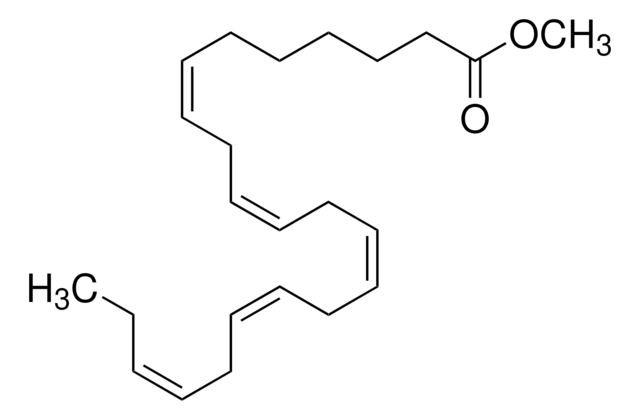H9021
Methyl cis-10-heptadecenoate
≥99% (GC), liquid
Synonym(s):
cis-10-Heptadecenoic acid methyl ester
Sign Into View Organizational & Contract Pricing
All Photos(1)
About This Item
Empirical Formula (Hill Notation):
C18H34O2
CAS Number:
Molecular Weight:
282.46
MDL number:
UNSPSC Code:
12352100
PubChem Substance ID:
NACRES:
NA.22
Recommended Products
Assay
≥99% (GC)
form
liquid
storage temp.
−20°C
SMILES string
CCCCCC\C=C/CCCCCCCCC(=O)OC
InChI
1S/C18H34O2/c1-3-4-5-6-7-8-9-10-11-12-13-14-15-16-17-18(19)20-2/h8-9H,3-7,10-17H2,1-2H3/b9-8-
InChI key
JNSUZRHLHDQGPN-HJWRWDBZSA-N
Looking for similar products? Visit Product Comparison Guide
Related Categories
Storage Class Code
11 - Combustible Solids
WGK
WGK 3
Certificates of Analysis (COA)
Search for Certificates of Analysis (COA) by entering the products Lot/Batch Number. Lot and Batch Numbers can be found on a product’s label following the words ‘Lot’ or ‘Batch’.
Already Own This Product?
Find documentation for the products that you have recently purchased in the Document Library.
Customers Also Viewed
Martin N Andersson et al.
The Journal of experimental biology, 221(Pt 24) (2018-10-27)
Diet and ambient temperature affect animal physiology, survival and reproductive success. However, knowledge of how these environmental factors interact to shape physiological processes and life-history traits of birds and other animals is largely lacking. By exposing adult great tits (Parus
Cas Eikenaar et al.
Physiological and biochemical zoology : PBZ, 90(2), 223-229 (2017-03-10)
Most avian migrants alternate flight bouts, characterized by high metabolic rates, with stopovers, periods of fuel replenishment through hyperphagia. High-energy metabolism and excessive calorie intake shift the balance between damaging prooxidants and antioxidants toward the former. Hence, migration likely affects
Exposure assessment of epoxy fatty acids through consumption of specific foods available in Belgium.
Edward Mubiru et al.
Food additives & contaminants. Part A, Chemistry, analysis, control, exposure & risk assessment, 34(6), 1000-1011 (2017-03-30)
Epoxy fatty acids (EFAs) are secondary oxidation products formed from unsaturated fatty acid hydroperoxides. Seventeen food categories were analysed for C18 monoEFAs of food products available on the Belgian market. A quantitative exposure assessment was performed based on deterministic and
Our team of scientists has experience in all areas of research including Life Science, Material Science, Chemical Synthesis, Chromatography, Analytical and many others.
Contact Technical Service













